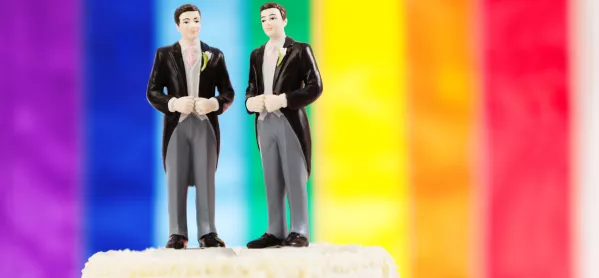- Home
- ‘Should schools or parents be responsible for the socialisation of pupils?
‘Should schools or parents be responsible for the socialisation of pupils?

When catching up with a group of teacher friends a few nights ago for what I thought would be a relaxing drink in central London, I made a big mistake. I innocently told them about a public debate I was involved in organising. The result was anything but a relaxing evening. Instead, it was three hours of heated argument that at times boiled over into ill-tempered accusations of intolerance levelled by usually open-minded people. What was the topic that so divided my seven teacher friends, I hear you ask - Brexit? No, it was whether the teaching of LGBT rights should be compulsory in schools?
- Opinion: ‘Don’t get angry about the LGBT row…’
- Quick read: ‘Fantastic’ says LGBT row teacher as protests are halted
In 2020, sex and relationships education (SRE) will become compulsory in English schools from the age of 5 onwards. The more immediate context is Parkfield Primary School in Birmingham, which hit the headlines last month after it became the scene of weekly protests by a group of mostly Muslim parents over its “No Outsiders” lessons, which some parents claimed were “promoting LGBT ways of life”. The programme, designed to foster inclusivity, was subsequently suspended indefinitely, until a resolution is reached with concerned parents. A truce has since has since been brokered between the school and the parents.
Speaking anecdotally rather than scientifically, it seems to me that most teachers support the statutory teaching of LGBT lessons and oppose parental objections.
‘Naked bigotry’ or religious right?
Now back to that not so relaxing drinks I mentioned where my friends tore into each other…Referring to the protests in Birmingham, my friend Roisin argued that, “to oppose LGBT lessons is naked bigotry disguised as victimhood”.
Orla agreed, saying: “Society has moved on from the Dark Ages, so liberals must stand firm against prejudice and the principle of equality must be respected.”
Saoirse said that, “if parents bring up their kids in the religious belief that homosexuality is wrong then they are indoctrinating them into homophobia and their kids will be homophobic”.
Ciaran agreed that such lessons should be compulsory for every student, arguing that schools had a moral duty to make sure that the kids of religious families went through such a programme and insisting that “there should be no free pass for the children of bigots”.
In contrast, Brendan could not contain his anger and accused Roisin, Orla, Saoirse and Ciaran of being “ideologically driven educators”. He argued that “it isn’t the role of schools to disabuse children of their family’s religious beliefs”.
Bernadette, who is both a parent and a teacher, argued that the “sovereignty of the family is fundamental and for the state to casually assume that it can force kids into such lessons against the will of the parents is scary and Orwellian”.
Declan, who confessed to being unsure about where he stood on the issue, said that he found it “worrying that some supporters of SRE were assuming that those who objected to it were somehow narrowminded or homophobes”, which he thought was not the case.
A way forward
It is obvious that there are deeply held convictions on both sides of this debate, so how do we navigate our way forward? First, we need to ask some philosophical questions as a prerequisite for making any progress. What do we mean by tolerance? Is a tolerant society one where, in order to tackle prejudice, bigotry and homophobia, we would compel every child to sit through SRE lessons? Or is a tolerant society one that affirms parental rights and autonomy, including the right to withdraw children from such programmes, at least until a certain age?
Put another way, is an intolerant society one that refuses to cede primary responsibility for the moral instruction of children to parents? These are difficult questions and divide the public. The approach must be to start an inclusive conversation about what we think tolerance means and where if any are its limits. Raising such questions does not have to divide parents and teachers or religious people and people of no religion.
The moral and civic norms of society are always in flux in a liberal society. But the key is not to close debate or impose things from above which some parents and religious groups fear the 2020 SRE curriculum does. Rather, the aim should be to involve everyone in the conversation as society changes and moves forward.
For what it’s worth, my own view is that if you want to teach these subjects, convince the parents first. Some clearly fear they will be bypassed.
In fairness to the No Outsiders programme, which has been in place for several years, parents were consulted and most had no problem with it. Instead of being stuck in our respective silos hurling insults (like my friends), let’s engage and ask more questions. For example, where is the line between sex education and values education? Here is another question, particularly relevant for teachers and parents: are we living in a historical moment where responsibility for socialisation and moral instruction is increasingly shifting from parents to the state and schools? And if so, how do we feel about that?
Kevin Rooney is a politics teacher
Keep reading for just £1 per month
You've reached your limit of free articles this month. Subscribe for £1 per month for three months and get:
- Unlimited access to all Tes magazine content
- Exclusive subscriber-only stories
- Award-winning email newsletters



